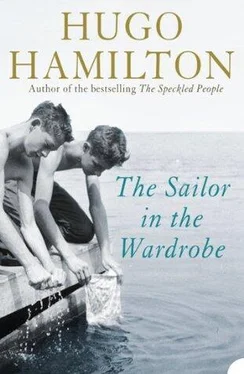‘It’s still your move,’ my father reminds me.
So then I concentrate as best I can. I glue the toffee up against the ceiling of my mouth, so that it’s plastered like a gum-shield against the palate. I can’t help sucking it, but at least I don’t have to chew it any more and make swallowing noises that are very irritating when you’re playing chess. My father is waiting and when I look at the board again, I make a quick decision. It’s only afterwards that I realize what a brilliant move it is, a bit of chess genius.
My father is trapped. He’s going to lose his queen. He stares at the board, trying every possible move in his head to get out of it. I keep the toffee-shield stuck to the roof of my mouth. The whole room is silent, waiting for the end when he shakes hands with me and says I’m getting better all the time. There is no way out for him. He’s doomed. I imagine it from his side and check every possible move. I can feel a rush of excitement, knowing that I have beaten him at last. It’s not polite either to boast about your move while he’s still thinking, so I don’t say a word until he eventually looks up at me. He has a fierce look in his eyes, blinking behind his glasses, and I cannot help smiling a little because the whole thing was just a fluke.
I want to help him. Maybe I should take back the move and allow him to protect himself a little better. He looks at the situation once more, but not for long. Then he puts his hand underneath the board and tips it over, before storming out of the room.
‘What’s going on now?’ my mother asks.
She jumps up from the table. She wanted the evening to end on a good note. The chess pieces are rolling across the table. My sister Ita bends down to pick up the fallen black king from the floor, but my mother tells her to leave it there.
‘Nobody is to touch anything.’
Everything is left there as it fell, with the chess board upside down and some of the pieces rocking back and forth, as if they were still alive and trying to get up to fight another day. My mother wants it all to stay like this, untouched, like a monument. My father had lost the ability to differentiate between a chess game and world events, as if everything is still a battle between black and white pieces. She goes up to the front room to tell him that chess is not war. She wants him to come back and not leave things as they are. She puts her arm around him, but he won’t be moved.
The rest of us are left staring at the ruins of the game on the table for a long time, waiting. But then I decide to pick up the pieces myself. I want to make it easy for him to come back and set up the board again. I want to tell him we’ll start a new game and this time I’ll try not to be so mean and sneaky. The board is ready and I want him to come back, just to play and not think of winning or losing. I wait and listen to the rain, like the sound of wheels spinning outside the window. Dozens of them spinning and whirring on their axles without stopping. Wheelbarrows. Upturned bicycles freewheeling silently. Every wheel in the world rolling along the gutters and gurgling away into the drains. I wait and wait, but he doesn’t come and we never again play chess after that.
It’s my mother who comes back and tells me a story so that I will understand my father. She wants me to think of him as a small boy living with his mother and his younger brother Ted in the village of Leap. His mother sent him out to get milk one evening when the moon was already out. The blue dusty light was falling across the street and made the houses look like cardboard fronts. Everything looked unreal in this soft white light. He carried an enamel canteen up the road to the farm and watched the woman milking for a while. The cows were restless and he watched the tail slapping into the bucket. He heard the woman speaking to the cow as she filled the canteen with warm frothy milk. He didn’t have to give her any money right away, because his mother always paid little bits off her bills in rotation. On the way home, the moon was so bright that my father fell and dropped the canteen of milk, because he was born with a limp and couldn’t trust himself walking.
‘The moon knocked me,’ he cried, when he got home.
His mother rubbed his head and said there was no harm done. She cleaned the cut on his knee and said it was no use crying over it. She didn’t want him to think it was the limp that was to blame, so she went to the door and spoke to the moon, pointing up into the night sky. Stop trying to trick people into thinking it’s daytime. My father must have thought it was still his fault that there was no milk for the morning. And now he’s still trying to make up for it and put things right long after they’ve happened and cannot be changed any more. He’s repairing history, my mother says, trying to pick up the moonlight from the street.
There has been no news from Stefan. Weeks have gone by since he left our house and my mother is worried that he has not sent any more postcards. She received one card from a place called Kilfenora, saying thank you for all the small packages of barm brack which she had packed for him, but nothing after that. All she got was a letter from Tante Käthe, saying that she has heard nothing. They are very worried because Stefan is the kind of person who is brought up to be polite and keep in touch, but now something is preventing him from writing home.
I can’t tell my mother about the conversation I had with Stefan, because she will be even more worried. I can’t tell her how he wants to run away from his father and Kilfenora isn’t even far enough away. I think of him in the West of Ireland somewhere finding another parcel of barm brack hidden in one of the secret side pockets of his rucksack. I know what that’s like, because Franz and myself went on a cycling holiday together one summer, down to West Cork, and my mother packed our bags as if we were going to war and we might find ourselves in a place where there was nothing to eat.
At the dinner table she asks everybody to think hard and imagine where Stefan has gone to and why he hasn’t been in touch, even if only to say that he’s fine. He doesn’t have to wait for something awful to happen before he contacts us. I can see that she is trying not to worry prematurely, but she feels responsible for any German visitor who comes to Ireland and gets lost. So we’re all sitting around thinking of Stefan eating the last piece of barm brack somewhere, taking shelter from the wind and looking out over the Atlantic. Everybody is silently searching the cliffs and the beaches in their minds. I think of him trying to learn Irish so that he can disappear completely from view and become invisible like all the other Irish speakers in Ireland. I can see him pretending to be fully Irish, trying to get rid of every trace of his German accent, giving the woman in a bed and breakfast in Kilfenora a false name, and her saying to herself that he’s a bit too tidy in his bedroom to be really Irish. I can see him moving across the mountains and the bogs, going into a pub and just nodding like everyone else and saying as little as possible, maybe telling people that he’s from Northern Ireland, from Belfast, so they don’t think his accent is strange. I can imagine the men in the pub saying that he looks a bit like the great German footballer, Beckenbauer, God bless him, and Stefan saying he wishes he was, but that he’s got two left feet and one of them is facing backwards.
So the letters are starting to go back and forth to Germany and everybody is wondering why Stefan is not in touch. After more crisis meetings and phone calls from Tante Käthe, they finally decide to call the Gardai.
It’s the first time that we’ve seen anyone in uniform in our house since I was very small, when there was a fox in the kitchen and the Garda came to tell us it was not a fox at all but a rat. This time it’s two Gardai who arrive in a squad car. They are brought into the front room and even though my mother has asked them to sit down like any other guests, they remain standing at first. There is an older sergeant who is quite thin, and a younger, more heavy man making notes. Neighbours passing by on the street outside must be wondering what is going on, if somebody in our house has broken the law. My mother is afraid of policemen and immediately begins to talk, telling them lots of things about Stefan that are not really all that relevant, like the fact that he did very well at school and that he’s got no reason for not returning to Germany to study medicine. She is disappointed that they are not taking more notes and begins to tell other things, looking for something that they will find worthy of putting down.
Читать дальше
Конец ознакомительного отрывка
Купить книгу












